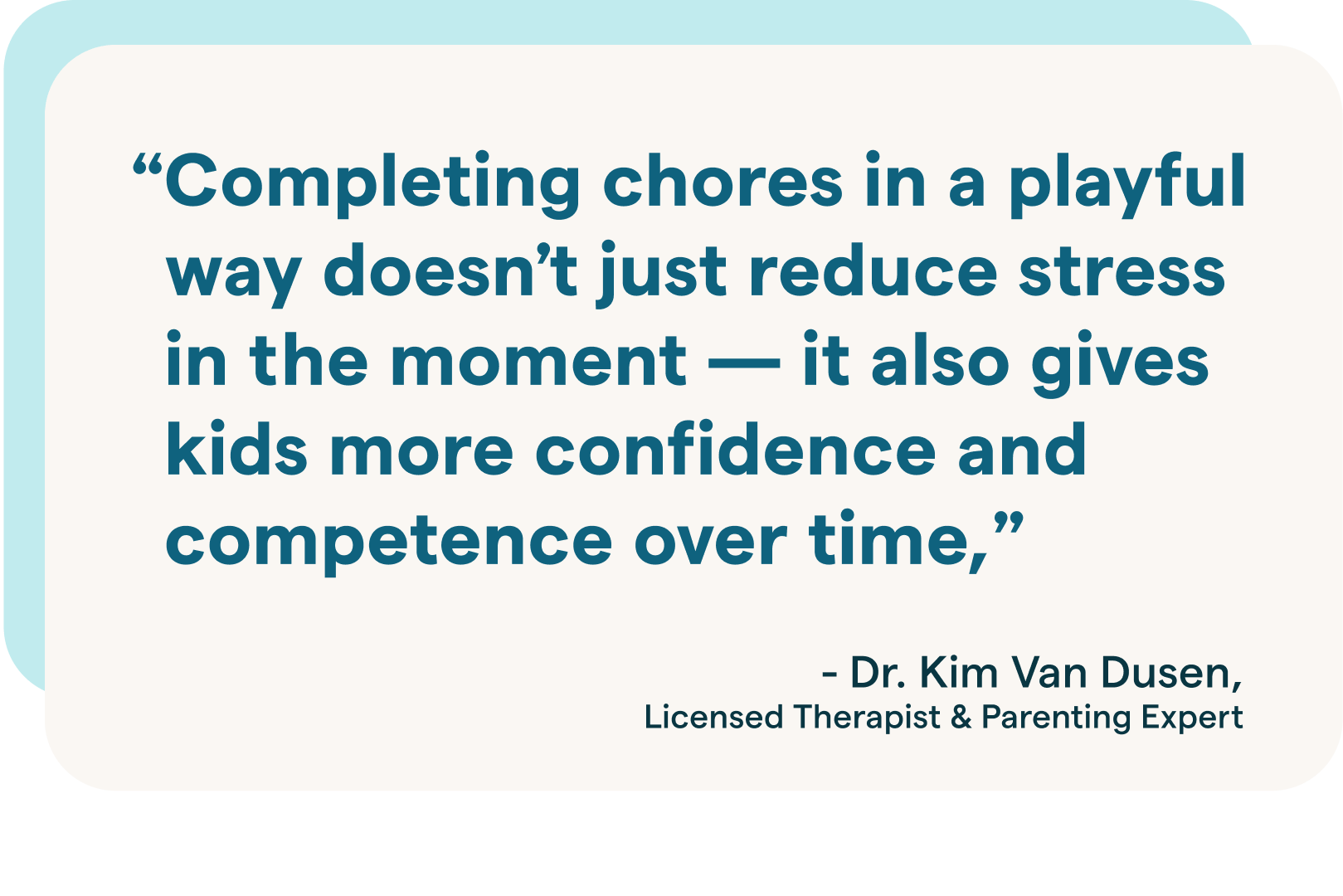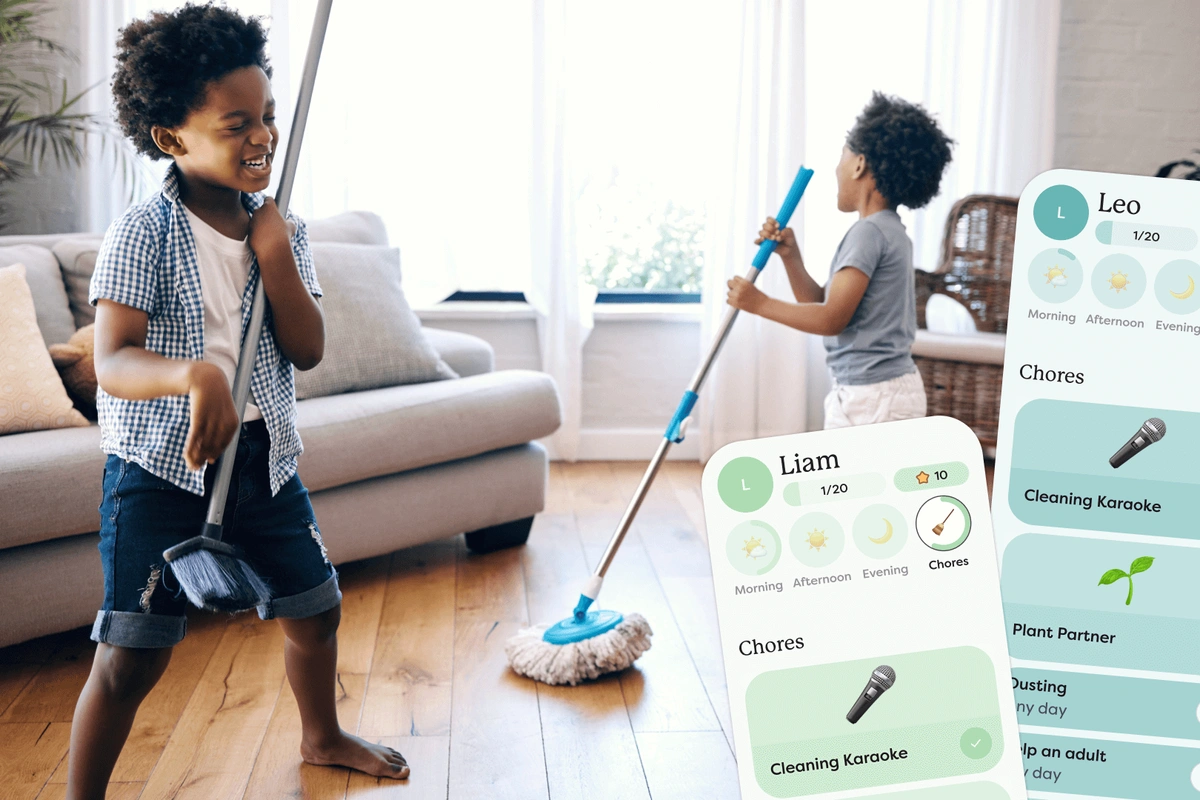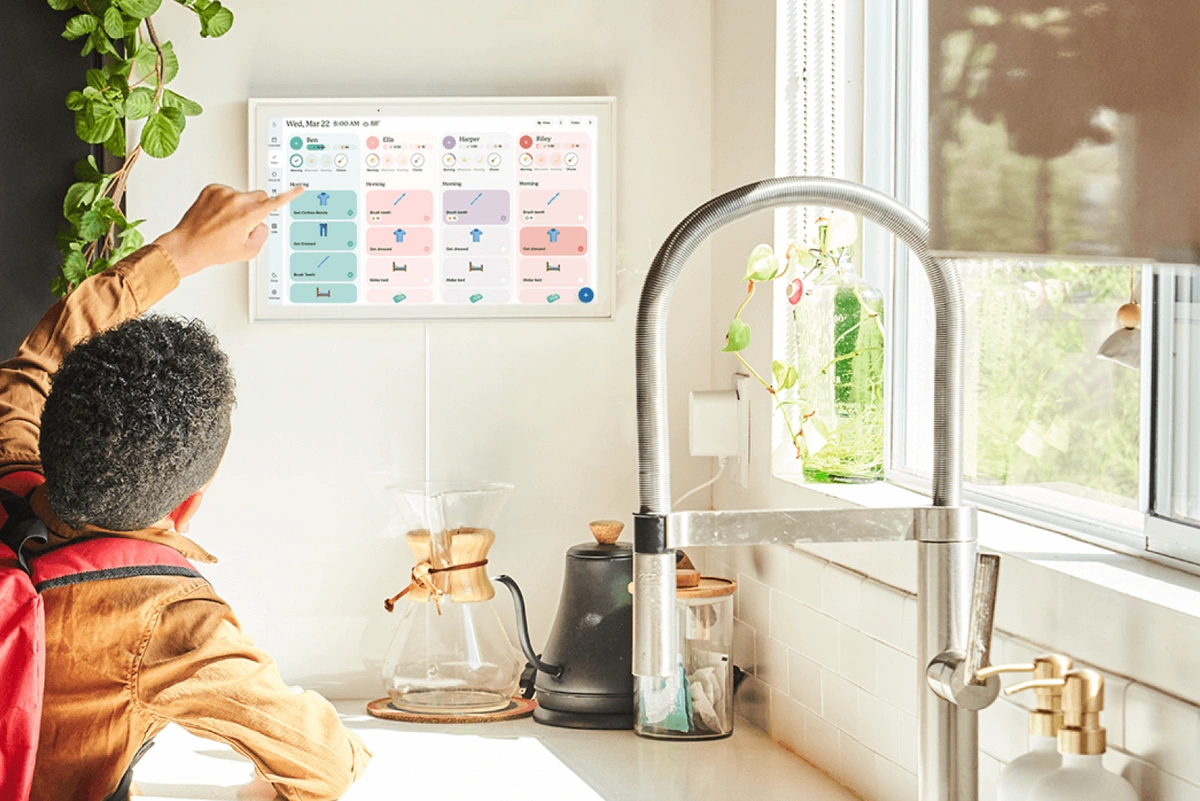How to Make Chores Fun for Kids

Imagine a world where emptying the dishwasher sparks laughter instead of groans. Ok, maybe not laughter (we can dream), but with a little creativity (and a clever parenting hack or two), chores can feel lighter, more playful, and even a little fun for the whole family.
That’s the power of family chore games. When you reframe everyday tasks as play-based chores, you shift the tone from conflict to connection. Suddenly, folding laundry or picking up toys becomes something the family does together, not just another box to check.
“Anytime you can make chores into a play-based game or a competition, you will get more cooperation from your child, which also means less power struggles, defiance, tantrums, and complaints,” says Dr. Kim Van Dusen, licensed therapist and parenting expert.
Below are 15 simple, research-backed ways to make chores fun for kids—with expert insight from Dr. Kim and practical tools to help you make routines stick.

15 Ways to Make Chores Fun for Kids
1. Turn Chores Into a Game
Add a competitive or playful twist—whether it’s racing the clock, tallying points, or seeing who can fold the most towels neatly.
2. Try Chore Hopscotch
Create a hopscotch board with chalk or tape, writing a chore in each square (feed the dog, water the plants, wipe the table). Kids toss a bean bag to land on their task.
3. Spin the Chore Wheel
A spinner adds suspense and fairness to chore selection. Kids love the element of chance.
4. Beat the Timer
Set a 5-minute timer and challenge the family to finish their tasks before it buzzes. Pair it with music for extra energy.
5. Play Sock Basketball
Clean-up meets basketball: toss balled-up socks into the laundry basket. Points for accuracy, chores for everyone.
6. Make It a Scavenger Hunt
Write chores on sticky notes and hide them around the house. Kids “find” a task and complete it for points or small rewards.
7. Add a Music Cleanup Break
Play a favorite song and see how much tidying can be done before it ends.
8. Create a Family Challenge
Parents vs. kids to unload the dishwasher. Siblings race to put away toys. Loser takes recycling out!
9. Rotate Chores Weekly
Switching up responsibilities keeps things fresh and teaches flexibility.
10. Use Visual Cues
Kids thrive on predictability. Write chores where everyone can see them (like Skylight Calendar).
11. Mix Play With Responsibility
Pretend laundry is a color-sorting game or sweeping is part of a dance party.
12. Celebrate Small Wins
High-fives, silly dances, or stickers go a long way in keeping spirits up.
13. Match Chores to Age
Kids love feeling capable. Start small and increase tasks as they grow. (See our full chores by age guide here).
14. Keep It Flexible
“Children thrive with predictable structure. That being said, we also want children to learn how to be flexible, and not too rigid, because life can change, even if we don’t plan for it,” Dr. Kim notes.
15. Connect It to Bigger Life Lessons
Research from Harvard shows chores build independence, family bonds, and long-term resilience. When kids see that helping can be fun, the lesson lasts.

The Benefits of Play-Based Chores
Turning chores into games isn’t just about getting the laundry folded faster. It’s about making everyday routines feel lighter, easier, and (dare we say) fun. Kids are naturally more engaged when something feels playful, and research shows they’re more likely to stick with routines when they have a sense of choice and ownership (American Academy of Pediatrics, 2022).
Some of the biggest benefits include:
-
Kids want to cooperate: When it feels like a game, kids lean in instead of pushing back.
-
Confidence building: Completing small tasks gives kids a sense of pride.
-
It brings families closer. “Work” turns into shared laughter and mini memories.
-
Consistency: When chores feel like part of a game, they’re easier to repeat.
“Completing chores in a playful way doesn’t just reduce stress in the moment — it also gives kids more confidence and competence over time,” Dr. Kim explains. “When children master small responsibilities, they begin to believe they can handle bigger challenges too.”

“Children will also have more buy-in when they know what to expect and when the chores and responsibilities are mixed up each week. And completing the chores will provide your child with more confidence and competence. By making it play-based, children may even actually look forward to chores!” – Dr. Kim Van Dusen
That’s where a tool like the Skylight Calendar can help. By setting up visible, shared routines, kids know what’s expected, and parents can spend less time reminding and more time connecting.
Want to see more about how Chores work on Skylight Calendar? Read our guide here.

How to Make Chore Routines Stick
Fun gets kids in the door. But for routines to last, kids need predictability. That’s where parents often get stuck: chores slip through the cracks or become reminders yelled across the kitchen.
The solution? Keep responsibilities visible and shared.
-
Write chores where everyone can see them.
-
Rotate tasks weekly to keep it fresh.
-
Mix in games to keep kids interested
“Children thrive with predictable structure and routines. [They] like to know what to expect ahead of time and some may need extra processing time to comprehend what is expected of them.
Once they can master their schedule, they feel more secure, competent, confident, and less anxious,” says Dr. Kim. “That being said, we also want children to learn how to be flexible, and not too rigid, because life can change, even if we don’t plan for it.”
The Skylight Calendar is built for this. Parents can assign chores by name and color, set recurring tasks, and even add fun reminders like “Laundry Basketball tonight!”
4-Month Free Returns: Give the Skylight Calendar a try. If you aren’t 100% thrilled with your purchase, return it for a full refund. No questions asked.

Chores as Life Lessons
It’s tempting to see chores as boxes to check off. But they’re more than that: they’re everyday lessons in responsibility, teamwork, and resilience.
Harvard research shows that kids who participate in chores from a young age grow up to be more independent, have stronger family bonds, and even report higher levels of satisfaction later in life (Harvard Health, 2019).
And when kids learn that helping can be fun, those lessons stick.
Final Takeaway
Chores don’t have to be the family battle of the day. By turning them into games, and giving kids clear, shared expectations, parents can transform daily tasks into opportunities for growth, bonding, and even fun.
Explore Skylight Calendar today
Special Thanks To…
Dr. Kim Van Dusen, a Licensed Marriage and Family Therapist, Registered Play Therapist, and the creator of The Parentologist, where she shares parenting tips with a therapeutic twist. Find Dr. Kim:
